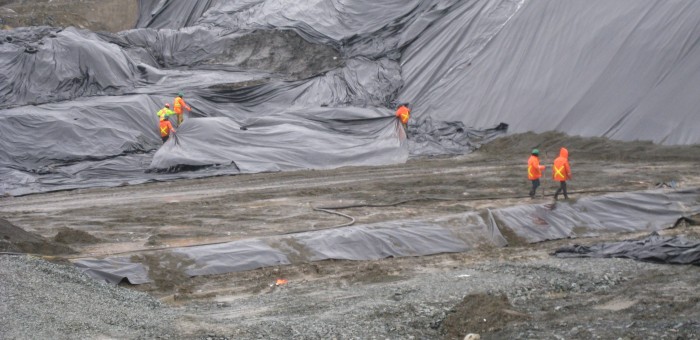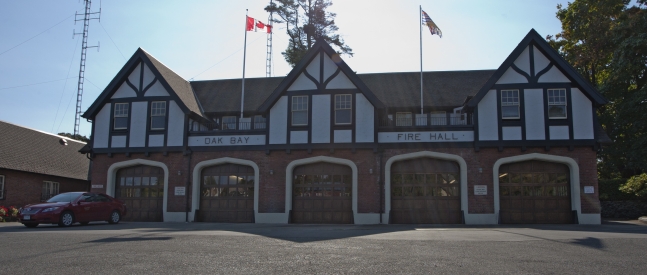Bill 41 — Miscellaneous Statutes Amendment Act (No. 3), 2015
Today in the legislature I rose to speak at second reading on Bill 41, Miscellaneous Statutes Amendment Act (No. 3), 2015. Bill 41 proposed amendments in four general areas:
- Advanced Education
- Children and Family Development
- Energy and Mines
- Justice amendments
I generally spoke in favour of the amendments with notable caveats that I will explore further tomorrow at Committee stage. Below are the text and video of my speech.
Text of my Speech
A. Weaver: I rise to speak to Bill 41, Miscellaneous Statutes Amendment Act (No. 3), 2015. It’s another one of the miscellaneous statutes acts, this one with amendments in four different areas — the first, of course, being Advanced Education amendments that my colleague from Victoria–Swan Lake discussed recently. Part 2 is Children and Family Development amendments; part 3, Energy and Mines amendments, specifically with respect to BCUC; and part 4, Justice amendments.
This bill actually covers a rather large number of bills within the four categories: the Child, Family and Community Service Act; the College and Institute Act; the University Act; the Interjurisdictional Support Orders Act; and the Utilities Commission Act.
The amendments clarify a few definitions and generally expand regulatory and exemption powers for the Lieutenant-Governor-in-Council or, in the case of the Utilities Commission Act, the minister assigned in the place of the Lieutenant-Governor-in-Council. This amendment bill seems to follow a pattern of a rather large number of these bills we’ve seen this year where the legislation is made somewhat increasingly vague and left up, often, to the discretion of the appointed minister or regulator.
With respect to the Child, Family and Community Service Act, the amendments are said to enable the expansion of the agreements with young adults program, allowing the Ministry of Children and Family Development to extend the duration of agreements and raise the age limit. Now, this is important. This is an important piece of legislation that is dealing with the transition of youth from the ages of 18 to 19 who often fall between the cracks as they move from being a child to an adult. Being able to allow the…. The amendment will allow and enable agreements to be used for life skills programs, in addition to the current educational, vocational and rehabilitation programs, meaning that children will be able to transition better.
I was speaking this last Saturday with an RCMP officer from the Victoria region, out on the West Shore, who said that the single most common call they get are calls with respect to adolescent mental health issues. Now, part of the problem, of course, is that these adolescents who move into adulthood fall between the cracks after they age out. This legislation allows ministries to actually coordinate — extend the coverage — under Children and Family Development, and it’s a very fine piece of legislation that I’m very proud to support.
On the same note, the changes to the Interjurisdictional Support Orders Act add further amendments that I’m very pleased to support. In particular, the changes will allow for child and spousal support decisions from other provinces and territories and countries to be more efficiently processed. The administrative changes will allow support order decisions from jurisdictions that do not provide court-certified copies of decisions, such those reached by tribunal, to be registered with the B.C. court. In addition, instead of using the court sheriff services to serve applications for support from other jurisdictions, the director of maintenance enforcement will now use a private process server.
Out-of-province support orders are often hard to collect and said to account for about 11 percent of family maintenance enforcement program cases. So again, an important piece of legislation within the broader Miscellaneous Statutes Amendment Act.
Then we move to the Utilities Commission Act changes. Now, the member for Vancouver-Kingsway — I believe it was Vancouver-Kingsway — gave a very eloquent and fine analysis of the changes to the Utilities Commission Act, in particular how it affects BCUC. The changes include…. They’re being told to implement recommendations from the BCUC — British Columbia Utilities Commission — Core Review Task Force. That task force was initiated by government in 2014 in responses to concerns raised by customer groups and utilities about BCUC’s capacity to deliver clear and timely decisions.
The proposed legislative amendments are said to increase the BCUC’s effectiveness and efficiency and reduce the cost of regulation for ratepayers, who pay for BCUC in their utility raise. It all sounds fine at face value, but in terms of the implementation, what’s being proposed is that the amendments really seem to focus on increasing power and exemption abilities of the minister.
Now, while some ratepayer groups consulted during the core review are said to support these changes, it’s a disturbing trend that we’re seeing more and more often within this government’s legislation: to put more and more power in the hands of fewer and fewer and ask British Columbians to trust us. As we saw earlier today, there are times when “trust us” simply is not good enough.
The final component of this Miscellaneous Statutes Amendment Act is with respect to changes to the College and Institute Act and the University Act. As I mentioned, my colleague from Vancouver–Swan Lake did a fine job outlining some of the…
Interjection.
A. Weaver: Did I say Vancouver–Swan Lake?
With humble apologies to the member from Victoria-Quilchena, the member for Victoria–Swan Lake outlined some of the issues that some university student groups have felt concern on. The amendments here to both the University Act and the College and Institute Act make adjustments to how fees are collected, or can be collected, from people who leave student societies. The Minister of Advanced Education says he will consult with student societies to determine which program or service fees should be protected under legislation.
I understand why this legislation was brought in. With the recent passage of the Societies Act, we were left with a rather concerning gap in legislation, which led to questions as to what would happen to the fees if students pulled out of the student societies. I recognize that the minister, in consultation with a variety of student groups, put forward the amendments that we see before us today in both the order papers as well as in the original act.
There has been some concern that too much power will be granted to the minister to determine what is or is not considered a fee. It’s something that…. Rather than pass judgment on it at this particular junction, I will ask for some specific examples during committee stage, to get on record a certain number of these examples to see whether or not this is what the minister believes to be considered as student fees or student charges.
As the member for Victoria–Swan Lake…. The UVic Students Society has been quite vocal about their concerns with this specific piece of legislation. They knew that changes regarding fees levied against those who leave the student society were coming. They were concerned. They did not expect the format that the government used to bring these changes in to be the one we see today. In fairness to the minister who brought in the changes, it’s not clear to me, in the time frame that the minister had, that it was able to, under the same umbrella, bring all potential types and qualifiers and identify all those that would be viewed to be student fees now. The minister has committed to engaging student groups in the future to discuss this.
Nevertheless, it has left an element of uncertainty. When there’s uncertainty, there’s concern, because student groups — not only the University of Victoria and others — believe that they are being asked to trust us once again.
I will say that the student group at the University of British Columbia seemed to be more supportive of the changes as put in, although they, too, note the irony of almost a catch-22 being in place. I don’t think it’s fair, but a catch-22 is in place, where they say that the Societies Act seems to imply, quite logically, that only members of a society can cast votes on society business.
Yet there is an administrative problem, because students who resign their membership must continue to pay student fees. The bill specifies that these students must also continue to have voting rights. That seems to be in conflict with the Societies Act. But, as I will outline, there are ways around this, which brings me to a comment. I’m concerned that, in fact…. Ironically, in light of the amount of time we’ve spent during this session discussing red-tape reduction, it seems to me that one of the consequences of this amendment is a rather substantive increase in red tape to be applied to student organizations in British Columbia.
The bill separates the fees that students face into multiple, regulation-dependent categories, which may operate in different ways. There are a number of issues that I can think of that need to be addressed in the committee stage, as I mentioned, that I’ll cover later. But first, this bill creates the so-called red tape for student societies that I alluded to earlier as follows.
Previously, a simple annual vote took place. Annually, students would vote. That vote took place to elect a student board and was used to pass any new funding. The student board would be elected. New funding would be approved or not approved by a referendum, and it would be done with all students who are members of the student union or society voting.
However, the bill appears to morph this process into a far more convoluted red-tape process. I should have worn some red tape over my suit here today. Student societies must now account for a new category of students who will cast ballots on funding referendums and not on the student election.
This strikes me as odd — that you’ll have various groups of students voting on various things, in light of the fact that student turnout at the best of times is not as high as it could be. They already suffer from limited turnout in many universities around the province, let alone making this much more complicated and having different categories of students being able to vote for something or against something.
Secondly, the bill confers, I would argue, unnecessary powers to the minister to decide which fees apply in which ways. Now again, I recognize that this probably was left as a matter of regulation in light of the timeliness of trying to get something passed this session so that student groups collecting fees from students who secede from the union or society that represents them would be in place sooner than later. I recognize that.
However, there are questions that we can explore at committee stage, and they’ll follow along these lines. In general, there’s an issue with the increased reliance on regulation to set policy. However, in that case, there should be a simple remedy. Consult with student unions about the specific fees they levy and draft the legislation accordingly.
Again, we are told that the regulations will come in place through consultation with the student groups. Again, as I’ve argued earlier and pointed out, some of these student groups more so than others feel that they’re being asked to trust the government. Depending on the various student groups, some will trust them more than others.
Interjection.
A. Weaver: The minister, of course, is suggesting that we should all trust government. Well, as I mentioned earlier, trusting government in many cases is simply not good enough. We don’t have to reiterate the example we heard today during question period and the resolution I brought forward for emergency debate on the Shawnigan Lake situation.
The change, as I mentioned, also appears to allow the government to decide which fees are appropriate. That, again, could potentially limit the union’s or society’s ability to challenge government decisions it doesn’t support.
Let’s suppose, hypothetically, that the university of somewhere in B.C. decides to form…. Through referendum, the students decide that they want to put a group there, a union. Their union, through the fees, have decided a club is going to be formed. It’s going to be the “We have to get the Liberals out in 2017” club.
Now, that’s a fee that has been approved by referendum, and students then…. Maybe one or two in the university who don’t agree with that pull out of the student society. The decision as to whether or not that fee that was elected democratically…. Whether or not the students who pull out can actually take their payment of the fees with them is left up to the minister to decide.
Clearly, there is a potential conflict there. There’s a potential question as to whether or not the minister will or will not support. I gave a rather crass example. But we could actually move a little closer to where it’s not so clear. Obviously, all of British Columbia has sincere trust in the present Minister of Advanced Education to do absolutely no wrong at any time. Let’s suppose, hypothetically, that there were a minister who ideologically did not believe that men could be with other men and marry other men, and that therefore that minister…. I’m sure there are many of them in this government who feel that way strongly. Perhaps they are in a position of decision-making.
They, then, could decide: “You know what? These fees are not allowable.” Hence the concern of some student groups over others. Now, as I pointed out, this clearly would not happen in British Columbia with the esteemed leadership of the Minister of Advanced Education, also representing Vancouver-Quilchena. But there may be other ministers, at some point in the future, who will be less trustworthy.
Finally, I will say that much of this I’m going to try to deal with in committee stage, by providing specific examples of specific clubs that do exist already in some universities, and see whether or not the fees to these clubs were the types of fees that the minister was thinking are allowable to actually be passed on as a direct cost back to the students union if the students pull out of the union or the society that represented them.
With that, I thank you for your time.
Video of my Speech
Appealing for Emergency Debate on Contaminated Soils in Shawnigan Watershed
Today in the Legislature I rose, pursuant to Standing Order 35, to call for an emergency debate on the recent failure of the contaminated soil site storm water containment and clarification system at the South Island Aggregates/Cobble Hill Holding/South Island Resource Management operations.
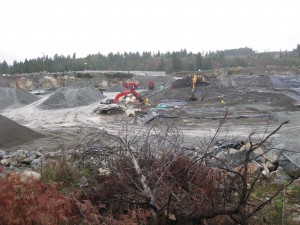 There are two active cases before the BC Supreme Court concerning the process that led to the granting of the permits by the Ministry of Environment. The CVRD is seeking to have its land-use bylaws upheld, as this is not a permitted land use for this location. The Shawnigan Residents Association has filed a Judicial Review of the decision by the Environmental Appeal Board to uphold the permit, and they have brought forward new and very important information that was not considered by the Environmental Appeal Board. Local residents are desperate to protect their water supply, and last week two people were arrested outside of the site.
There are two active cases before the BC Supreme Court concerning the process that led to the granting of the permits by the Ministry of Environment. The CVRD is seeking to have its land-use bylaws upheld, as this is not a permitted land use for this location. The Shawnigan Residents Association has filed a Judicial Review of the decision by the Environmental Appeal Board to uphold the permit, and they have brought forward new and very important information that was not considered by the Environmental Appeal Board. Local residents are desperate to protect their water supply, and last week two people were arrested outside of the site.
Below I offer an extract from Hansard where I provide rationale for why I believed that holding such a debate was of urgent public importance. Please note that in a postscript below I reproduce the Speaker’s ruling.
Text of my Rationale
A. Weaver: I rise pursuant to Standing Order 35. As advised in Standing Order 35, I gave the Chair notice, and I have provided a written statement of the matter proposed to the Clerk.
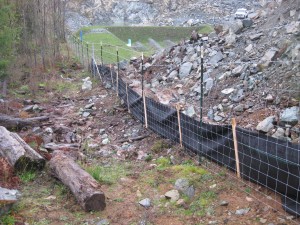 By leave, I move that this House do now adjourn to discuss a matter of urgent public importance — namely, an emergency debate concerning the recent failure of the contaminated soil site stormwater containment and clarification system at the South Island Aggregates — Cobble Hill Holdings — South Island Resource Management operations.
By leave, I move that this House do now adjourn to discuss a matter of urgent public importance — namely, an emergency debate concerning the recent failure of the contaminated soil site stormwater containment and clarification system at the South Island Aggregates — Cobble Hill Holdings — South Island Resource Management operations.
There were, in the past few days, at least two documented breaches of water bypassing the system into the Shawnigan potable water stream network. On November 13, Island Health issued a no-water use advisory “advising residents not to use water taken out of the lake from the south end of Lake Shawnigan, south of Butler Avenue and Verlon Road, due to suspected overflow of water from South Island Aggregates’ site.” This means that residents were being advised “not to use or draw water from the area of the lake for residential or commercial use, including bathing, personal hygiene, drinking and food preparation.”
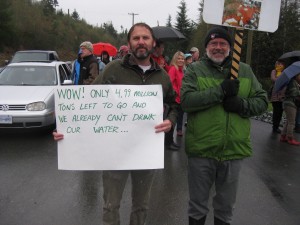 This morning I visited the area today to witness many scores of residents of Shawnigan Lake standing along the roadside desperately seeking government action. Despite the fact that members opposite think this is a joke, I walked around the facility this morning, and there is water running off that facility today in violation of the permits that they have been granted. Yet we have the side opposite thinking this is somehow a big joke.
This morning I visited the area today to witness many scores of residents of Shawnigan Lake standing along the roadside desperately seeking government action. Despite the fact that members opposite think this is a joke, I walked around the facility this morning, and there is water running off that facility today in violation of the permits that they have been granted. Yet we have the side opposite thinking this is somehow a big joke.
Last week a steady stream of trucks brought in high-sulfur soils, further contaminated with hydrocarbons from the metallurgical coal activities that occurred at Pacific Coast Terminals in Port Moody. Five thousand people draw their drinking water from this lake, and 12,000 people live within the region.
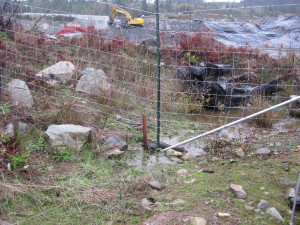 There are several court cases before that we will obviously not have time but could explore in debate, and local residents have documented many cases of non-compliance. And as of this morning, the Island Health water advisory remains in place.
There are several court cases before that we will obviously not have time but could explore in debate, and local residents have documented many cases of non-compliance. And as of this morning, the Island Health water advisory remains in place.
As should be clear, the need for this debate is urgent. Trucks are not delivering sediments today but will start again tomorrow. British Columbians are facing very real health impacts from a decision this government has made, and there has not been and will not be an opportunity for this issue to be debated appropriately other than within the scope of Standing Order 35.
Video
Postcript
Today the government house leader, Honourable M. de Jong spoke against having such an emergency debate by saying:
“I also, in fairness to the member, indicated that I would review his remarks from last day with respect to yesterday’s application for an emergency debate and will only say this: again, by virtue of the rules and precedents that apply around the application of section 35, I don’t believe the required threshold has been met in the submission made to the House, and thereto the application to invoke Standing Order 35 should, in my respectful opinion, be declined.”
The NDP neither supported nor opposed the emergency debate.
The Speaker subsequently ruled against having the debate.
Appreciation for Oak Bay Emergency Services
This evening I had the distinct honour of attending the Oak Bay Emergency Services Appreciation Banquet. I had the opportunity to extend deep appreciation and respect for the daily efforts and dedication of Oak Bay’s emergency services towards the health, safety and betterment of our community.
Text of my remarks
Good evening and thank you for the kind invitation for Helen and me to attend tonight’s banquet. We are honoured to be here with you.
Please let me join others here in thanking you, Oak Bay’s emergency service members, for your dedicated, professional and selfless service to our community — for being there in our times of need.
I am pleased to be here tonight to honour the work you do in the service of others. As citizens, we are reassured in knowing that you are there and ready to help us when needed. Dave Carroll’s song in the video (also shown below) we just watched says it all — you are everyday heroes. To quote from the lyrics:
When people in the world need savin’
The saviours who answer the call
Don’t get paid anymore for danger
Or get to pick the one’s they want
They just go to where the few will go
To maybe lay it all on the line
Just to do their job, do it one more time
Many of us may only have brief contact with you in the course of our lives, but the work you do has life-long impact on so many that you serve in the community.
You encounter and witness events in the course of your work that most of us will never see. I’m sure you sometimes wish some things could be unseen, but that is not your reality. There is often a heavy price to pay for your work – with shift work, emergency call-outs, interrupted family life and the inherent danger you face in the course of your duties. You are often dealing with emotionally difficult and highly intense situations. Instead of running from danger, you run courageously towards it and focus on the job you are trained to do.
To quote from Franklin D. Roosevelt: “Courage is not the absence of fear, but rather the assessment that something else is more important than fear”.
We are also very appreciative for all the work that you do to support our community. We see you at numerous community events, you fundraise for charity and undertake important liaison work in the schools and through education in the areas of prevention and safety.
Helen and I would like to extend our deep appreciation and respect for your daily efforts and dedication towards the health, safety and betterment of our community.
Dave Carroll’s Everyday Heroes Video
Bill 40 – Natural Gas Development Statutes Amendment Act, 2015
Today in the legislature we proceeded to second reading of Bill 40 – Natural Gas Development Statutes Amendment Act, 2015. Bill 40 introduces a number amendments being made within the jurisdiction of the Minister of Natural Gas Development and Responsible for Housing. I am supporting this important piece of legislation for reasons that I outline in my speech below.
First, this legislation enables the Oil and Gas Commission to develop and regulate any potential carbon capture and storage initiatives in BC. As I noted in my speech, in my view this is critical for future atmospheric carbon dioxide removal. And British Columbia is the home of the world’s first pilot project to test the viability of technology for use in commercial scale carbon scrubbing. This exciting project is the brainchild of Canadian researcher David Keith, now a professor at Harvard University, and is being developed a Calgary-based company Carbon Engineering.
The second aspect of this bill concerns important changes changes to the Residential Tenancy Act and the Strata Property Act. They allow tenants to break a fixed-term tenancy agreement with one month’s notice to escape family violence or if a tenant moves to a long-term care facility. Electronic repayments of a tenant’s damage deposit is now also allowed.
The Strata Property Act changes allow an 80% instead of a 100% vote to wind down and subsequently disband a strata. I discuss this more in the speech below.
Text of Second Reading Speech
A. Weaver: It gives me great pleasure to stand and rise in support of Bill 40, the Natural Gas Development Statutes Amendment Act, which, as has been mentioned already by several members both in opposition and in government, is really an amalgamation of two bills that reflect the two separate mandates of the minister involved in housing and natural gas.
Now, I will say off the bat that I do appreciate the introduction of the carbon-capture-and-storage-enabling legislation, as well as the amendments to the Strata Property Act and the Residential Tenancy Act, as I do believe they are fine pieces of legislation. But there is…. Again, the devil will be in the details, and I will explore that further in committee stage of the debate.
I would also like to thank, at the onset here, the ministry staff for providing us — my office and, in collaboration and at the same time, the member for Delta South’s office and her staff — with a very fine briefing that allowed us to ask many questions to gain insight as to the intentions of this legislation.
Now, as I’ve mentioned, I do recognize the importance of carbon-capture-and-storage-enabling legislation. My concern with this is not so much that enabling legislation is being introduced, but it’s being introduced under the purview of the Oil and Gas Commission. Let me please explain why I would do that.
There are two aspects to carbon capture and storage. There are the aspects with respect to capture and storage from what’s called geological carbon. That’s carbon that’s contained in our fossil fuels — the combustion of coal and the combustion of natural gas produce carbon dioxide. And that carbon dioxide, it’s been thought…. It has in some jurisdictions been stored underground. B.C. has a rich history of capture and storage in the sour gas component of the natural gas industry, so there is some expertise here in British Columbia already in terms of underground gas storage.
However, the second aspect of carbon capture and storage is capturing and storing not fossil carbon but present-day carbon in the atmosphere. We have, in Canada, a company that has developed under the intellectual leadership and scientific analyses and studies of David Keith, now at Harvard University, formerly at the University of Calgary. This company called Carbon Engineering has actually built its very first test site in Squamish, B.C., to capture and sequester carbon that’s already in the atmosphere.
Now, this is an example of innovation in British Columbia that I haven’t heard anything about from the opposite side. This is an example of innovation in carbon capture technology that actually is what we do need to go down sooner rather than later — that is, drawing down carbon from the atmosphere that’s already there, because the climate change in store as we equilibrate to existing levels of greenhouse gases will be profound.
So this technology, embedded within the company Carbon Engineering and situated in Squamish now with their first test facility, is fascinating in that what it does is it brings in air from the atmosphere. It then takes that air and mixes it so that you get out of that a liquid product that then reacts with solid products to create calcium carbonate. The carbon dioxide is now stored in this so-called wet phase in these little pellets. These pellets are then heated, and the pellets can then be recycled to create more calcium carbonate. In that heating process, you produce a stream of pure carbon dioxide. Now that carbon dioxide, which is a pure stream, originated in the atmosphere and can be stored in carbon capture and storage.
I believe that this government should be putting this legislation not in oil and gas but in the Environment Ministry. We have no hope of any realistic LNG coming to B.C. anytime soon. I’ve been saying that for over three years now, and I’m still waiting to eat my words as the Minister of Natural Gas said I will be doing. I notice he’s not listening right now. But I would love to be in a position of eating my words. I’m still not eating them.
Let me quote from a news release that was issued yesterday on Bloomberg — a news story from the Goldman Sachs group, which says the following: “A wave of new supply from Australia to the U.S. is deepening a glut of the fuel, raising the risk of losses for exporters and prompting some buyers to look at breaking contracts with suppliers.” Those are existing contracts.
Goldman Sachs is not a fly-by-night organization. Goldman Sachs has forecast a 13 percent drop in LNG prices in 2017 and a further 23 percent drop by 2018. And the U.S. starts shipping LNG in January of 2016.
We have no hope, yet this government is pursuing carbon capture in the oil and gas sector and is missing out critical opportunities in the innovative carbon capture sector with a Canadian company, a Calgary company, whose first test plant anywhere in the world where this is being done is in Squamish, B.C.
Do we hear anything about that? No, we hear about this fantasy of LNG, on and on. That is why it is deeply troubling that this will actually be contained within the Oil and Gas Commission because, frankly, carbon capture and storage is more than about oil and gas. It’s a grand environmental issue and should, I would argue, be based in that.
The spot price in Japan, the much-touted, soon-to-become market for all of B.C.’s gas, is $6.13 in 2016, compared to $7.49. Goldman Sachs has projected a $5.19 spot price for landed LNG in Japan in 2017 and — get this — a $4.75 spot price in Japan for 2018.
I’m not eating my words yet. I’m still waiting for the Minister of Natural Gas to show me that…. He says to himself: “You will.” No, I don’t think so — not any time soon. Maybe in the mid-2020s, but by that time, of course, there’ll be nobody accountable left in this government, because there will be a new government at that time.
As I said, I do support the carbon capture legislation that’s being brought here. We do need enabling legislation for carbon capture, just not the carbon capture this government is dreaming about. It’s about the innovation potential that we could have for innovative Canadian technology and building upon that sector.
This bill also contains important legislation changes which will protect employees within the Oil and Gas Commission from potential legal problems, providing, of course, that they make decisions in good faith, as I’m sure we would all expect our governing agencies and bodies to do and have faith and confidence that they will.
The second aspect of this bill is with respect to the rental tenancy act and the Strata Act. Now, as someone who presently lives in a bare land strata and someone who’s had a property in another strata, I recognize the difficulty in getting 100 percent agreement in a strata. Sometimes the owners of the strata don’t even live in the country where the strata is. It’s very, very difficult.
It takes just one person out of 100 to be difficult, and nothing will happen. So I recognize the importance of actually moving to a slightly lower threshold in the wind-up resolution for a strata — you know, 80 percent, 90 percent, 85 percent. I don’t know where the numbers come from. We’ll explore that a bit further in the committee stage. But I do agree and commend the minister for seeing this problem here.
One of the other things that I think needs to be discussed further in committee stage will be a potential effect, an effect that may not have been thought through, on affordability in areas such as Victoria, Vancouver and some parts of the Okanagan as strata owners recognize the value in their property.
Say you have an aging demographic who own an older building and there’s 80 percent of them who see the value in their property and say: “Maybe we should sell this so that a developer can turn this four-storey building into a 20-storey building. Look at the wealth and the prosperity that we will have.” But maybe there are a few other people out there who don’t actually have the ability to find another place. So there is some concern about people being displaced, as there might be an incentive here…. In fact, I would argue this is an incentive for certain strata to think about winding up, tearing down, selling and building anew.
Now, I recognize that that would build new supply, new rentals perhaps, new ownership and supply, and that’s a good thing, but supply does not come on stream overnight. There’s a delay as these are built, so there has to be some careful management of that, I would believe.
It’ll be interesting to see whether or not bare land stratas across the province will start seeing this as an opportunity as well. Many builders are able to build bare land stratas where the local municipal bylaws don’t actually have to have the same level of rigour in terms of their application — widths of streets, areas for sidewalks, etc. — and there may be some pressure from bare land stratas in the months ahead to actually come off that. I don’t know how that will be handled.
In terms of the rental tenancy, again, I support the additions that have been done. I think it’s critical, in fact, to allow those who are, for example, fleeing a violent relationship and those who become very ill all of a sudden and can no longer be in their residence a means and a way, through consultation and approval by some authority — which we’ll explore further in regulations, I’m sure; we’ll see further what that means in regulations — to break a lease without having to be burdened with subsequent bills from landlords who, in many cases — particularly in Victoria, where we have a 0.6 percent vacancy rate — could, in fact, rent it and, frankly, would rent it to another person.
Finally, on the electronic payments, again, it’s incredibly important to bring this up to the 21st century. A lot of rental transactions are done through electronic payments, both in terms of receiving rent and in terms of removing damage deposits, but there is a slight caution here with the electronic payments, as the member for Delta South pointed out.
If you make an electronic payment, some people will think that they’ve made an electronic payment and it’s done. But until the recipient actually receives it and deposits it into a bank account, there is no receipt or transaction. Now, not everybody in our society has a bank account. If a landlord sends an electronic transaction, the landlord may think that the electronic transaction has been sent within…. I forget the number of days. It may be 28. It may be slightly more or less.
If that transaction is not received and deposited into an account, that transaction is deemed null and void, so there would be questions with respect to whether or not the landlord, in good faith, tried to transfer the deposit or whether they did not. This is particularly problematic with landlords who may not live in the same jurisdiction as the house that is being rented, where electronic transfers are quite common.
With that said, with the caveats aside, I do support this legislation. I look forward to exploring it further in committee stage, and I thank the Speaker and the members for their time.
Video of Second Reading Speech
We need to end the trophy hunt in British Columbia
Today I had an OPED appear in the Times Colonist. I reproduce it below with several hyperlinks added.
In the grizzly hunting debate, the BC legislature appears to be the last stronghold protecting the trophy hunting industry in our province.
Economic, scientific, and social justifications for the practice don’t add up. Ecotourism and bear viewing companies generate more revenue than their trigger-happy counterparts, and they are far more sustainable over the long term. There is considerable uncertainty within the scientific community about grizzly bear population numbers and notable concerns about how they will adapt to the challenges climate change will bring. Polls repeatedly put public opposition for trophy hunting in British Columbia in the 90% range, for both urban and rural populations and resident hunters who overwhelmingly oppose the practice.
This is where we must draw an important difference between trophy hunting, and hunting.
Trophy hunting is the killing of an animal for the sake of the kill, the sake of collecting a trophy often a severed head. It is a cruel, selfish, and barbaric practice that is packaged and sold as a sport. Trophy killing has little to do with the thousands of British Columbians who hunt because they enjoy spending time outdoors, respect the animals they harvest, and take great pride in sharing the meat they harvest with their loved ones. If we are going to end Trophy Hunting in British Columbia, we must first understand that it has nothing to do with hunting. As the legislation currently stands, it is illegal to waste meat when hunting in British Columbia, unless the animal you have killed is a cougar, wolf, lynx, bobcat, wolverine, or grizzly bear. The edible parts of big game must be removed from the animal and packed out to one¹s home, or importantly for non-resident hunters, to a meat cutter or a cold storage plant. These last two options provide trophy hunters with legal meat laundering opportunities, meaning that they could still hunt for the trophy but give away the meat.
In March I brought forward a Bill, supported by First Nations Summit, that would close this loophole, forcing the packing out of all meat from all animals (not just grizzly bears) hunted in British Columbia to a person’s home, whether that be in British Columbia, Texas, Australia or Germany. This was carefully written to protect the rights of First Nations and resident hunters in British Columbia, while going after the practice of trophy killing. As you might imagine, the guide outfitting industry did not support this legislation. I suspect many a trophy hunter would find it difficult, if not impossible, to pack out several hundred pounds of Trichinosis laden grizzly bear meat across international borders. As with all legislation, its success or failure relies on proper implementation and a commitment to enforcing it.
When legislating the practices of non-resident hunters, the rights and interests of First Nations and British Columbians should still be first and foremost. We need legislation that says in this province we hunt for food, not for the sake of killing – it is not okay to come here to kill our animals for a prize. Hunting should not be a corporate endeavour. Furthermore our government needs to acknowledge and act upon calls from First Nations who have enacted bans on trophy hunting in their traditional territories.
What has surprised me about this debate is how little our elected officials have had to say about it, given the almost unanimous opposition to the practice amongst British Columbians.
Both the BC Liberals and the BC NDP have refused to have an honest discussion about this issue in the legislature. The BC Liberals point to the studies that justify their inaction, all the while ignoring the growing body of academic literature that suggest action is needed.
The BC NDP on the other hand have yet to state any firm position on the issue. One hopes that this isn¹t simply avoiding taking a position on an important issue for fear that it will help their electoral prospects.
While this is certainly an emotive issue, it’s one that most British Columbians agree on. Trophy killing debases the very legitimate reasons that many British Columbians choose to hunt. It’s time we enact policy that understands the difference between the two, and finally puts an end to trophy hunting in British Columbia.


